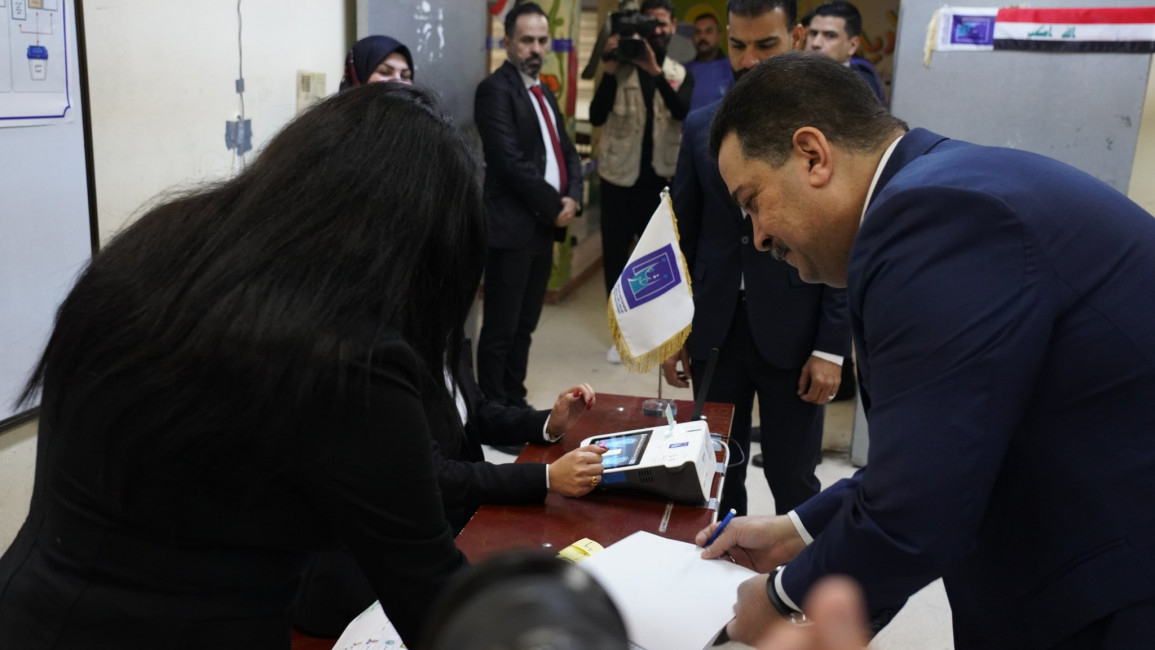Iraq elects local governments, challenges persist in Kirkuk and Diyala
Most of Iraq's provinces have elected local governments, with traditional factions securing significant roles despite the decreased seats. However, political disagreements have prevented the provincial councils in Kirkuk and Diyala from convening their inaugural sessions.
Iraq held its first provincial election in a decade on 18 December 2023, which witnessed a low voter turnout of 41 per cent due to a boycott by the influential cleric Muqtada al-Sadr's political movement.
The elections were held across 15 provinces (excluding four in the northern Kurdistan region). Iran-backed Shia parties, including Nouri al-Maliki's State of Law Coalition and Hadi Amiri's We Build Coalition, emerged victorious in several provinces.
So far, provincial councils in Najaf, Basra, Anbar, Nineveh, Babylon, Dhi Qar, Muthanna, Baghdad, Karbala, Wasit, and Salahuddin have held their inaugural sessions and elected key positions of the governor and heads of the councils.
The State of Law coalition has so far secured the positions of the president of the Najaf Provincial Council and Baghdad's governor and lost several positions in other southern provinces.
Baghdad Provincial Council has elected Amar Al-Qaisy, from the Sunni Azm Alliance, as head of the council. It also elected Abdul-Mutalib al-Alawi as governor.
In Kirkuk, a multi-ethnic and contested province, a Kurdish alliance comprising the Patriotic Union of Kurdistan (PUK) and The Kurdistan Communist Party won the most votes, with Arab Sunnis in second place and Turkmen in third.
However, Kirkuk's provincial council failed to hold its inauguration session on Monday as the Arab and Turkmen blocs boycotted it. The political disagreements centre around the governor of Kirkuk, as the Kurds say the position is their electoral entitlement; however, the Arabs and the Turkmen are also eying the critical position.
On Monday, the Najaf Provincial Council unanimously elected Hussein al-Issawi from the State of Law coalition as its head and his deputy, Gaith Shaba, from the Al-Aasas Alliance, led by the acting Parliament Speaker Mohsen al-Mandlawi. Youssef Kanaoui from the National Wisdom Movement was elected governor of Najaf, while Ammar al-Jazaeri from the Asa'ib Ahl al-Haq movement became his deputy.
Basra Provincial Council has elected Khalaf al-Badrani, from We Build Coalition, as its president, while Osama al-Saad from the Tasmeem bloc led by Basra Governor Assad al-Edani was elected as his deputy. The council also unanimously elected al-Edani to serve as governor for a second term.
In Anbar's predominant Sunni Province, Omar Mashan Dubous Aldulaimi, from the Taqadum (Progress) bloc led by Iraq's former parliament speaker Mohammed al-Halbousi, was elected as the head of the province's council, with Akram Khamees Al-Muhlaoui as his deputy. Mohammed Nouri Al-Karbouli, from the Taqadum bloc, was also elected as the governor.
The Wasit Provincial Council elected Ali Hussein Salimoun as the council president with an absolute majority and Mohammed Jameel Al-Mayahi as governor for a second term.
In Diyala Province, Nazar Al-Lahibi was elected as the council president, while the position of governor has not been decided yet.
The Karbala Provincial Council has elected Qasim Al-Yassiri from We Build Coalition as its president and Mahfouz Al-Tamimi as his deputy. The council also re-elected Nasif Jasim Al-Khatib as the governor for another term, with Ali Al-Meali as his deputy.
Similarly, the Salahuddin Provincial Council elected Adel Abdul Salam as the council president and Ahmed Al-Jubouri as the governor. Two deputies for the new governor were also voted on.
The last provincial elections in Iraq occurred on 20 April 2013, resulting in a majority win for al-Maliki. However, in response to the 2019 anti-corruption protests, the Iraqi parliament voted to dissolve the provincial councils on 28 October 2019.
On 13 November, Iraqi Shia cleric and political leader Muqtada al-Sadr called on his supporters to boycott local elections, which analysts expect will cause a low voter turnout.
Notably, the Iraqi National Accord, led by former Prime Minister Ayad Allawi, chose not to participate in the elections.
The current vote is a test for the country's emerging democracy established post-Saddam Hussein's removal in 2003 by an illegal US and UK-led invasion. These elections are crucial in shaping power dynamics in the multi-nation country amidst growing influence from Iran-aligned groups.
Kirkuk's multi-ethnic and oil-rich province participated for the first time since 2005 despite being in a constitutionally disputed area between the Kurdistan region and the federal government in Baghdad.



